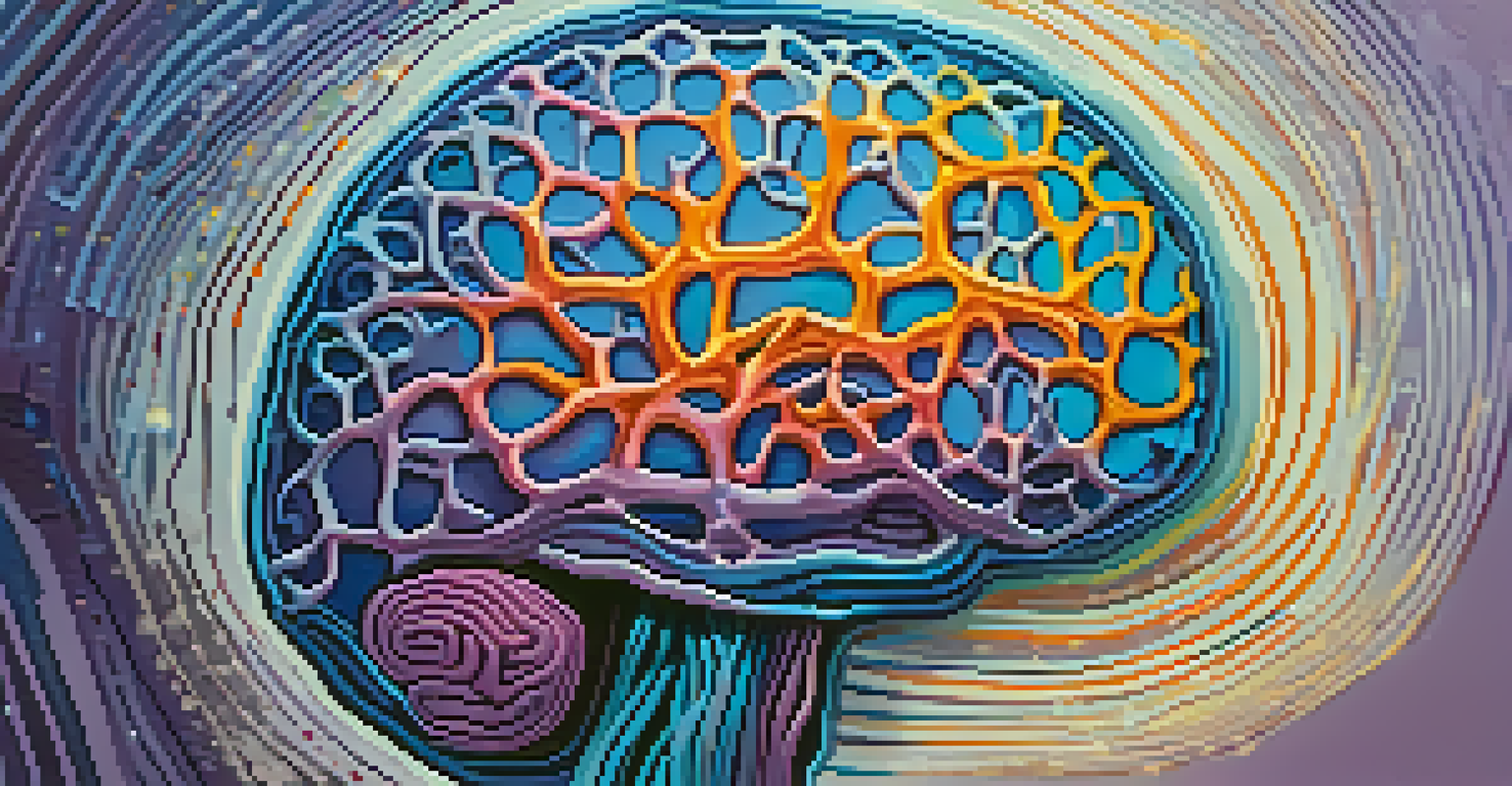Therapeutic Benefits of DMT: Patient Case Studies

Understanding DMT and Its Role in Therapy
DMT, or dimethyltryptamine, is a powerful psychedelic compound that has gained attention for its potential therapeutic benefits. While traditionally associated with spiritual experiences, recent research has begun to uncover its role in mental health treatment. Patients report profound insights during DMT experiences, suggesting it may help in addressing conditions like depression and anxiety.
Psychedelics can facilitate profound shifts in perception and consciousness, leading to transformative healing experiences.
The mechanism behind DMT's effects is still under investigation, but it’s believed to interact with serotonin receptors in the brain. This interaction can lead to altered states of consciousness, which some describe as life-changing. Such experiences may help patients confront unresolved issues, making DMT a valuable tool in therapeutic settings.
As we delve into patient case studies, we’ll explore how DMT has been utilized in various therapeutic contexts. These individual stories not only highlight its potential but also raise important questions about safety and integration into traditional mental health practices.
Case Study 1: Overcoming PTSD with DMT
One compelling case involves a veteran struggling with PTSD for years. Traditional treatments had provided little relief, leaving him feeling trapped in his trauma. After participating in a guided DMT session, he reported a significant reduction in flashbacks and anxiety, attributing this shift to the insights gained during his experience.

During the session, he encountered vivid imagery and emotions that helped him process his traumatic memories. This cathartic release allowed him to reframe his experiences, fostering a sense of empowerment rather than victimhood. Following the session, he found he could engage more fully in therapy and daily life.
DMT's Potential in Mental Health
DMT shows promise as a therapeutic tool for conditions like PTSD, anxiety, and depression through profound insights gained during experiences.
This case illustrates how DMT can serve as a catalyst for healing, offering a new perspective on deeply ingrained trauma. While more research is needed, stories like this provide hope for those seeking alternative treatments for PTSD.
Case Study 2: Navigating Anxiety and Depression
Another patient, grappling with severe anxiety and depression, turned to DMT as a last resort. Conventional medications had led to undesirable side effects, prompting her to seek out alternative therapies. After a carefully monitored DMT session, she reported a profound sense of calm and clarity that she had not experienced in years.
The mind is everything. What you think you become.
The experience revealed patterns in her thoughts and behaviors that contributed to her anxiety. With the support of her therapist, she began to implement changes in her daily routine, leading to gradual improvements in her mental health. The insights gained during the DMT session became a foundation for her ongoing therapeutic work.
This case emphasizes the potential of DMT to facilitate meaningful self-reflection. By illuminating underlying issues, DMT can empower patients to take actionable steps toward recovery.
Case Study 3: Enhancing Spiritual Well-Being
For some individuals, DMT serves as a bridge to spiritual enlightenment. One patient, who had struggled with feelings of disconnection and purposelessness, sought DMT as a means to explore deeper existential questions. The experience was described as transformative, providing a profound sense of unity with the universe and a renewed sense of purpose.
This patient reported that the insights gained during the DMT experience helped her navigate her life choices with greater clarity. It encouraged her to pursue a career in counseling, where she could help others find their own paths. The spiritual awakening she experienced catalyzed a shift towards a more meaningful life.
Importance of Integration Post-DMT
Integrating insights from DMT experiences into everyday life is crucial for maximizing therapeutic benefits and fostering long-term healing.
Such experiences highlight DMT's potential to not only alleviate psychological distress but also foster spiritual growth. This dual benefit can be particularly appealing for those seeking a holistic approach to well-being.
The Importance of Integration After DMT Experiences
While the experiences facilitated by DMT can be profound, the process of integration is equally important. Patients often find themselves in need of support to make sense of their experiences and apply insights in their everyday lives. Therapy sessions following a DMT experience can provide a safe space for this exploration.
Integration involves discussing the insights gained, emotions felt, and any challenges faced during the DMT experience. This step is crucial as it helps individuals ground their experiences and incorporate them into their healing journey. Without proper integration, the potential benefits of DMT may be lost.
Therapists trained in psychedelic integration can guide patients through this process, ensuring a more holistic approach to healing. This ongoing support can enhance the therapeutic benefits of DMT, making it a more effective tool for many.
Potential Risks and Considerations with DMT Therapy
As promising as DMT therapy may be, it’s essential to consider potential risks. Not every individual is suited for psychedelic experiences, and there can be adverse reactions, including anxiety or disorientation. Therefore, thorough screening and preparation are vital before embarking on a DMT journey.
Additionally, the setting in which DMT is administered plays a significant role in the overall experience. Safe, controlled environments with trained facilitators can help mitigate risks and enhance the therapeutic potential. This underscores the importance of approaching DMT therapy with caution and respect.
Risks and Considerations of DMT
While DMT offers therapeutic potential, careful screening and a controlled environment are essential to mitigate risks associated with its use.
Understanding these risks does not diminish the value of DMT but rather emphasizes the need for responsible use. With proper precautions, DMT can be a powerful ally in mental health treatment.
Future Directions: Research and Acceptance of DMT
As interest in psychedelics grows, so does the need for rigorous research on compounds like DMT. Current studies are paving the way for a better understanding of its therapeutic potential, yet more extensive clinical trials are necessary to validate findings. The scientific community is beginning to recognize the value of these substances, but societal acceptance still lags behind.
For DMT to be embraced in mainstream therapy, there needs to be a shift in perception. Education and awareness can help demystify psychedelics and highlight their potential benefits. This cultural change is essential for integrating DMT into conventional mental health practices.

The future of DMT in therapy is promising, with the potential to enhance treatment options for various mental health conditions. Continued research and open dialogue will be crucial in shaping this narrative.
Conclusion: The Promise of DMT in Healing Journeys
In conclusion, the therapeutic benefits of DMT are becoming increasingly evident through patient case studies. From overcoming PTSD to enhancing spiritual well-being, DMT has shown potential as a transformative tool in mental health treatment. However, responsible use and integration remain critical for maximizing its benefits.
As research continues to unfold, we may see DMT becoming a more accepted part of therapeutic practices. The stories of those who have experienced its benefits serve as powerful reminders of the potential for healing, understanding, and growth.
Ultimately, DMT represents a frontier in mental health treatment, challenging us to rethink traditional approaches and embrace new possibilities. With careful consideration and open-mindedness, DMT could lead many on their own paths to healing.